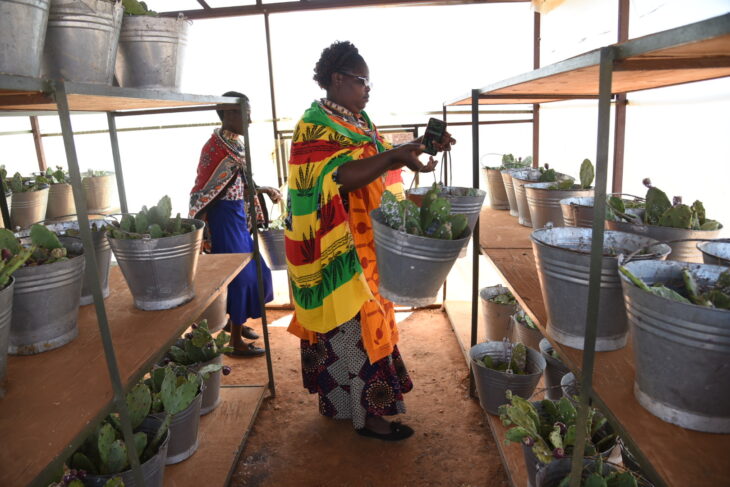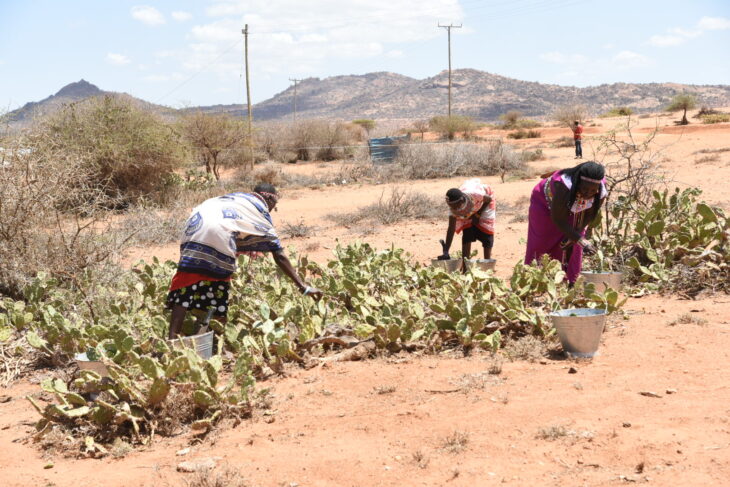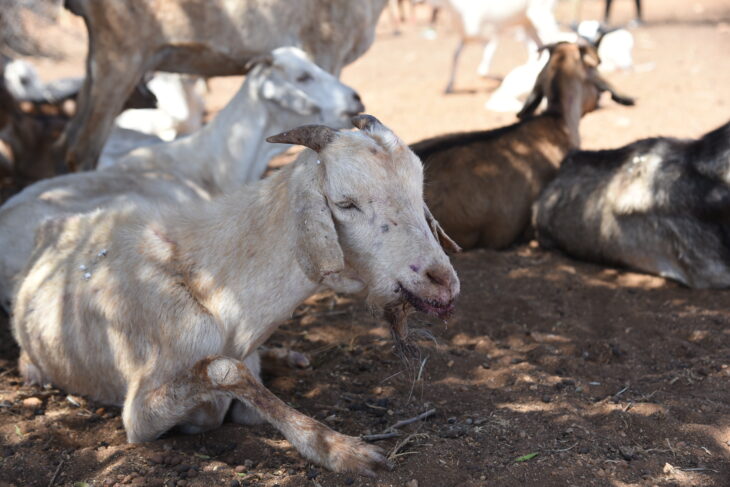LAIKIPIA, Kenya, Jul, 5 – Their traditional dresses, accentuated by ornaments woven into their flapping capes under the scorching Laikipia sun make them stand out. As they gingerly walk across grazing lands in Samburu county, it is the two metallic buckets they each carry, that distinguish them from the rest of the women in their community.
The contents they carry are considered a weapon against an invasive plant that was once deemed to be ornamental by the British colonial settlers, who dotted the area, after setting up an outpost in Doldol area. Now, however, it has become a thorn in the side of this pastoralist community.
Opuntia Stricta, also commonly referred to as the prickly pear or pear cactus has now more than ever been declared enemy number one by local communities across Laikipia county due to its destructive nature that has seen vast grazing land being destroyed.
It is a native plant from The American continent that was introduced to Kenya in the 1950s by colonial settlers.
The plant, to put it bluntly, is choking the livelihoods of residents with vegetation for livestock being wiped out by its needle-like spikes which have a defensive mechanism that the cacti use to protect itself.
“It inhibits anything else growing around it. Over time, it took over the rangelands, destroyed perennial grasses as well as adaptable plants, and now it has colonized the rangelands that are full of Opuntia and it can not sustain our livestock,” said Jacqueline Nalenoi, County director Mt. Kenya, Northern Rangelands Trust (NRT).


They have become a major threat to food security, biodiversity, and the well-being of residents since they have a high ecological and competitive ability as well as an efficient reproduction and dispersal mechanism.
“In the past, we used them as fencing for our homes but when they grew too fast, our livestock started eating them and then they became sick, some lost their sight and others developed mouth ulcers,” said Pauline Mamai, resident Naibunga Upper conservancy.
Pauline Mamai is part of a group of women that have been trained by the Northern Rangelands Trust (NRT) to combat the spread of the plant.
In this community, in Naibunga Upper conservancy, the Opuntia has colonized much of the vast land with its effects being felt far and wide. Women specifically are said to encounter its challenges firsthand since they receive livestock returning to their homestead in the evening and realize the ailments they suffer from.
Also, their children who consume the Opuntia fruit which is bright purple and is said to be sweet are said to suffer from constipation amongst other illnesses when consumed in large amounts.
Teams consisting of 15 women often used on a rotation have now taken up the mantle of combating the invasive plant after receiving training from NRT.
The women are trained on how to use the Cochineal insect that is specific to the Opuntia and does not affect other vegetation. The insect is reared within the community in greenhouses.
“We normally smear the Cochineal on the Opuntia and the after two weeks we repeat the process. this will allow the insect to consume the plant and it will be destroyed,” said Mamai.
“Women are readily available to work and they are passionate about this project because when you talk of all these livestock effects, it is the women that deal with the livestock and even take children to hospital when they fall sick,” said Mamai.
The group of women earn a decent Sh500 at the end of each task and are able to support their families.
With the biting drought ravaging through the country, Samburu is among the counties that have been identified as most affected, grazing lands that would have lessened the effects of the drought however have become useless to herders in turn making the local economy unstable.
Local veterinary institutions have cited, mouth ulcers, and clogged intestines among animals as the number one cause of death and emaciation that has affected animal productivity.

“Scientifically, it grows vegetatively meaning if it drops anywhere it will live, it needs little water to grow. Elephants are probably the number one dispersers since they feed on 2,000 seeds per day and they can travel 2,000 kilometers before defecating, livestock and Olive Baboons also feed on it and are spreaders,” said Nalenoi.
George Olesentari, who has been combating the plants since the 1950s says that he has lost scores of his livestock but has called for concerted efforts to fully eradicate the menace.
“I am glad the Cochineal insect is assisting in eradicating them but we need to conduct this extermination on a much larger scale,” he said.
“We are trying to get coordinates of where we do the spread and maybe in the next 5 or 10 years we will have dealt with this menace since they are being spread by other animals such as elephants and hopeful we can kick off a proper rehabilitation exercise of those rangelands,” said Alex Teiyo, resident Naibunga Upper Conservancy.
The project which was kicked off by NRT in 2015 seeks to eradicate the Opuntia in the coming few years with the further investment required in order to restore the rangelands to their former glory as well as properly equip the women who have dedicated their time to eradicating the invasive plant.
Want to send us a story? Contact Shahidi News Tel: +254115512797 (Mobile & WhatsApp)


